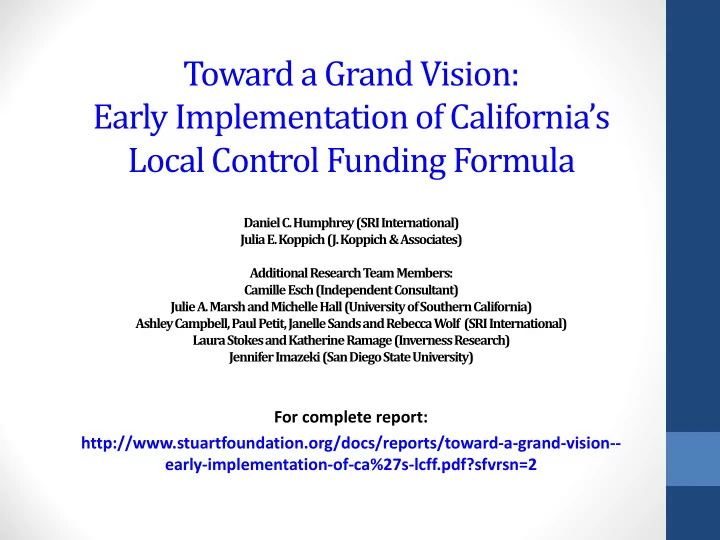

Toward a Grand Vision: Early Implementation of California’s Local Control Funding Formula Daniel C. Humphrey (SRI International) Julia E. Koppich(J. Koppich& Associates) Additional Research T eam Members: Camille Esch(Independent Consultant) Julie A. Marsh and Michelle Hall (University of Southern California) Ashley Campbell, Paul Petit, Janelle Sands and Rebecca Wolf (SRI International) Laura Stokes and Katherine Ramage(Inverness Research) Jennifer Imazeki(San Diego State University) For complete report: http://www.stuartfoundation.org/docs/reports/toward-a-grand-vision-- early-implementation-of-ca%27s-lcff.pdf?sfvrsn=2
Research Questions • How are school districts using their newfound budget flexibility in this early implementation phase? • How are they engaging parents and other stakeholders? • What opportunities and challenges do they foresee with the LCFF? • What can state policymakers learn from these early experiences?
Methods • Policy maker Interviews • Document review: 40 LCAPs, district budgets, school board minutes • 10 Case Study Districts: Document review District, union, school board, parents, County Office in-person interviews (79 interviews) • 14 County Offices of Education telephone interviews (serving 458 districts) • Data Collection: July 21 th -September 12 th • Analysis and Reporting: September 18 th -October 28th
Enthusiasm for LCFF “I think it’s one of the most positive things that’s happened to public education in the last 40 years. It focuses attention on areas where we have the most need. It focuses on gaps…” “I think [the LCFF] is a wonderful direction. I wholeheartedly support what it aspires to do in terms of local control, bringing in the community to write their story [about] what they want for their kids.”
A Few Worries “Please leave it alone. Give us time to get used to it, to learn how to work with it, and to make it work for us.” “… I don’t think you can provide targeted supports on top of a foundation that is deficient and expect to get great results. If you are able to have a solid base and then truly supplement, then there are opportunities [for the LCFF] to really be a game changer for [low-income and EL students, for foster youth] and for all students. But that’s the dance.”
Changes to Budget-making “This year we began the [budget development] process from ‘What do we need?’ rather than from ‘What can we afford?’” “The LCAP process really pushed the emphasis on collaboration. We recognized that people were working in silos. And we had to change.”
LCAPs “What should have taken a year we had to do in 6 months.” “[District] people got excited about telling their own story until they started getting into the template and the Word document, which was super tedious and people got [discouraged] that this wasn’t their story but just some sort of compliance document…” “The LCAP is a living doc[ument], the SARC is an ex post facto [document] a year behind and they don't line up. We need to look at elements and overlap. Let's hope that the work continues and we're not expecting districts to continue to duplicate, triplicate, and quadruplicate these efforts.”
County Offices of Education “It’s a challenge for us to discard our categorical mindset. We’re moving from an accounting system to accountability. That’s a tough shift.” “We’re running on fumes.”
Meaningful Public Engagement “Meaningful engagement of parents, pupils, and other stakeholders…is critical to the LCAP and budget process.” “That's not engagement. It should happen at the school site and I really think there should have been a pot of money to do that. LCFF is a historic effort, but we really haven't prepared our frontline people, really principals, on how to do engagement.”
Meaningful Public Engagement “The schools with the highest parent involvement had the lowest unduplicated counts [the number of students in targeted groups]. Parents at the poorest schools have two and three jobs.” “Most principals were not aware of what had changed at the district level in terms of crafting a budget.”
Conclusion “This governor and this state board [of education] did something that has never been done in the United States without a court case. It changed the distribution mechanism from an equality formula to an equity formula. …I think that that unto itself is noteworthy, stunning, and amazing.” “Don’t make big changes. Give us time to get this right and, please, don’t return to prescriptive categorical funding.”
Recommend
More recommend